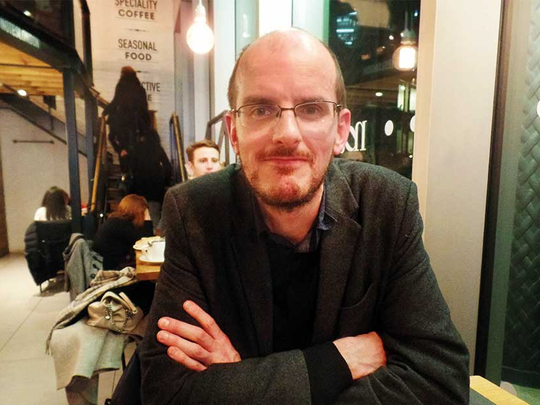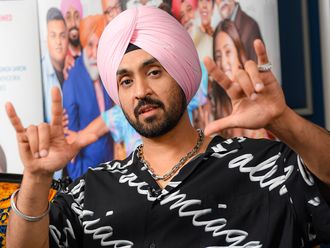
Is the world about to come to an end? It’s a question which many rational minded people would have contemplated in the wake of Donald Trump’s shocking rise to the American presidency. In such dark times, a good read to cheer yourself up is a book called Have a Nice Doomsday: Why millions of Americans are looking forward to the end of the world.
Its author, Nicholas Guyatt, is a lecturer in American history at Cambridge University.
The book looks at why 50 million Americans believe the apocalypse is going to happen in their lifetime, based on their interpretation of a Biblical prophecy. Although originally published nearly a decade ago, its subject matter is more relevant now than when the book first came out. “If you really believe the world is ending, you will probably find more evidence for that now than you have done at any other time in human history,” Guyatt tells me when we meet in a cafe near Kings Cross station, London.
“If you were an apocalyptic Christian, and you were looking forward to the end of the world, Trump seems like a pretty good candidate, right? I don’t know about you, but I have never been more worried in my adult lifetime about the fate of the world than I am right now,” he tells me.
Born and brought up in the UK, Guyatt received his PhD from Princeton University. In addition to his work on the apocalyptic movement, Guyatt is the author of several books on American history.
His most recent book, which came out last year, explores the origins of racial segregation in America. Bind Us Apart: How Enlightened Americans Invented Racial Segregation took Guyatt seven years to write. It was partly inspired by his experience of witnessing racial segregation in the US first hand.
Guyatt lived in the US from 1997 to 2004. After spending some time in Canada, he returned to the United States in the first year of the Obama administration for a fellowship. It didn’t make sense to Guyatt that schools and neighbourhoods were still segregated. “Schools without the law are still functionally segregated. So you still have massive segregation of racial populations, 50 years after Supreme Court has had this big decision saying you can’t actually legally enforce segregation,” he says.
Guyatt recalls being at Stanford, very close to the “glitzy” rich Silicon Valley world: “Although there is some diversity there, for example there would be people who are Arab American, you know Muslim Americans, there would be African Americans, Latino Americans on the faculty at Stanford, and in the student body, so there is the appearance of diversity,” he says. “But actually if you go off and look at people of colour living in the San Francisco area, as a whole you will see they still live overwhelmingly in segregated neighbourhoods. They send their kids to schools which don’t do as well as schools that white kids go to.”
Since Trump took over, there has been controversial talk of moving the US embassy in Israel from Tel Aviv to occupied Jerusalem.
Guyatt says the idea of making occupied Jerusalem the de facto capital for diplomatic purposes creates problems in international law. “East Jerusalem is recognised by international law as occupied territory,” he says.
Although he is a scholar of American history, Guyatt wrote a book about the Israeli-Palestinian conflict back in the 1990s. His interest in the topic began when he was still in high school. Once a week there was a slot in his school’s timetable for a member of the public to come and give a talk. At one of these sessions a speaker funded by the state of Israel was invited for a lecture. “She was giving, I would say, a pro-Israel vision of history,” he says.
At the end of the talk, Guyatt said to her, “I don’t think the Arabs started the Six-Day War. I think it was a pre-emptive strike launched by Israel, but it was Israel that started that war.”
Guyatt’s outburst created an “embarrassing” incident after which he decided to become more informed about the subject. When Guyatt went to study at Cambridge University he became involved with Palestinian society. “Here is my strange admission. I was in 1994 the president of the Cambridge University Palestinian Society. I am a white guy, right? But I was president of the Palestinian society.” The society had speakers who would give talks from either a Palestinian perspective, or they were Israelis who were critical of the occupation and what Israel had been doing.
One of the speakers was an Israeli woman called Lynda Brayer. She migrated from South Africa to Israel and became an Israeli citizen. Brayer studied for a law degree at Hebrew University. “When she was doing the law degree, the scales dropped from her eyes and she believed that Israeli law was structurally racist towards the Palestinians,” says Guyatt.
During her visit at Cambridge she asked Guyatt if he would consider volunteering in Jerusalem and Ramallah as a student during his vacations. It was the mid-1990s and the height of the Oslo peace process. Guyatt went to the Palestinian territories and worked for Brayer as a volunteer.
Some of his work was attempting to maintain the website for the legal aid society his sponsor had been running. It was still the early days of the internet. “Even though Palestine was, relatively speaking, a country that had been de-developed, actually they kind of skipped ahead to mobile phones and even the internet was [much] faster than in [other] places like the UK. There were far more mobiles in Palestine in 1997 than there were in the UK because they never had a reliable landline since Israel controlled the communications.”
Brayer was offering pro-bono legal work to people who were having their houses demolished, or having their ID cards confiscated. Guyatt met with clients who could speak English and tried to figure out the people Brayer needed to speak to, and the people she didn’t.
He helped her to write newspaper articles, booklets and information about the work she was doing.
A publisher in London called Zed Books was trying to get Brayer to do a basic introductory history of the conflict. She asked Guyatt if he would help her write it. “Because I had been very ignorant of all of this, and that is good, right? Because if you are writing a basic history, someone who has recently been very ignorant about it is a good person to have as a co-author.”
In the end Brayer was too busy to write the book so they asked Guyatt to do it. At the time Guyatt was only 23 years old. “I don’t think you needed to be much of an expert to see that Oslo was doomed,” he says. The Absence of Peace: Understanding the Israeli-Palestinian Conflict was finished during Guyatt’s first year at Princeton University in 1997, and published the next year.
Guyatt had been in Palestine during the time that Israel began trying to prevent students in Gaza from studying at universities in the West Bank. “If I can be completely honest with you, I would say that I saw some things in Israel regarding racial separation, which I think inspired me, or which I saw echoes of, when it comes to thinking about the American story of racial separation.”
Guyatt draws a parallel between segregation in the early United States and Palestine. “The idea that you can have ethnically distinct states, the idea that you can have a Jewish state, or the idea that Palestinians wouldn’t be integrated fully in Israel, or would be in a separate state in Palestine, separate from the Israeli state, all of this kind of ethno-nationalist kind of politics, is something that you begin to see in the early United States. So you know the big debate about whether Native Americans ought to be incorporated into the United States. Or ought to have their sovereignty respected outside the United States.”
The Native Americans were not given citizenship in their country. “Their land was taken from them, they were put in smaller and smaller reservations, or kind of cantons, and those reservations would be given sovereignty.”
Guyatt thinks some of the plan that Israel followed for the Occupied Territories has been very similar. “This is the problem with the Oslo process,” he says. “It created little islands of sovereignty for Palestinians, but it prevented those sovereign areas from connecting with each other, or from forming a proper viable contiguous state. And I think — especially as I have been finishing the book I have just written about Native American and African American racial re-alignment — the idea stayed with me that actually some versions of this are still around, not just in American history, but also in the history of the contemporary Middle East.”
Today, prophecies about the end of the world influence how millions of Americans view Middle East politics. Among the apocalyptic movement are people with very strong views about Israel. Guyatt had the opportunity to meet some of them while researching his doomsday book. “For me, as someone whose politics are not the politics of someone who is blindingly pro-Israel, that is kind of a problem. You know imagining the annihilation of the Arab world is not something that I like to do.”
Yet when Guyatt met these people and sat down with them, he got a very different sense of them as human beings than he would from some of their most terrifying propaganda rhetoric. “That sense of when you meet your subjects, you sort of humanise them, for a historian it is very interesting,” he says. “Because as a historian you usually don’t meet your subjects. Most of us work with people who are dead.”
It is unclear how influential the apocalyptic movement will be under Trump because many evangelical groups backed the Republican candidate reluctantly. “I don’t think you are going to be sued for libel if I tell you that Trump is not a person that people think of as very religious,” says Guyatt. “You know he is someone who had been extremely vulgar. Still, many evangelical groups backed him for presidency as they were opposed to Hillary Clinton.”
The apocalyptic significance of Israel made these evangelical Christians deeply committed to a presidential candidate who was extremely pro-Israel, says Guyatt. “If some of Trump’s supporters are white nationalists with anti-Semitic leanings, will Trump be able to hold on to these two parts of his coalition?” asks Guyatt. “Will he be able to hold on to these evangelical Christians who star themselves as the greatest friends of Jewish people on the planet, while not being Jews?”
“Or will he be able to remain friends with these white nationalists who are from an intellectual and political tradition, which is violently if not annihilationistly, anti-Semitic? That’s the question here, and I think it is going to be very hard for him to try and keep those two constituencies in the same place because make no mistake, these white nationalists are not themselves friends of this apocalyptic Christian movement.”
Guyatt talks about the possibility of people who believe in the apocalypse becoming part of a kind of feedback loop, whereby their belief makes them act in ways that make the end of the world more likely. “I worry about this a bit in the book, but I worry about it even more now in the age of Trump, because we don’t want the end of the world to be a kind of a self-fulfilling prophecy, right?”
Syed Hamad Ali is a writer based in London.









